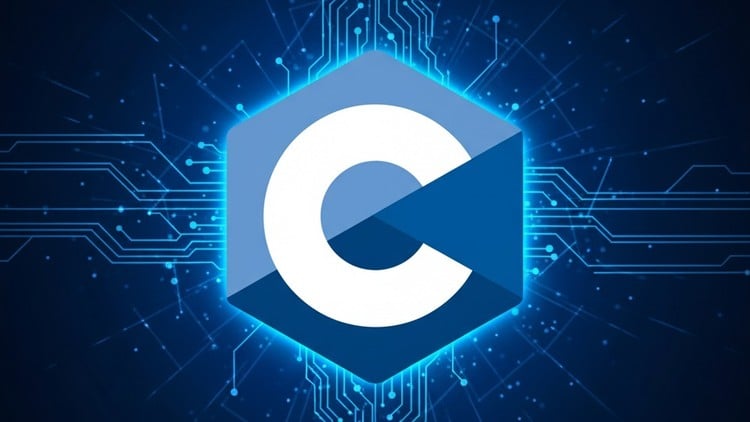
320+ C questions on syntax, pointers, and data structures. Perfect for acing your next coding interview or certification
👥 1,274 students
🔄 September 2025 update
Add-On Information:
Note➛ Make sure your 𝐔𝐝𝐞𝐦𝐲 cart has only this course you're going to enroll it now, Remove all other courses from the 𝐔𝐝𝐞𝐦𝐲 cart before Enrolling!
- Course Overview
- This comprehensive C programming practice test course is meticulously designed to solidify your understanding of C from its foundational elements to more complex, advanced concepts.
- With over 320 meticulously crafted questions, you will engage in rigorous problem-solving that mirrors real-world coding scenarios and interview challenges.
- The curriculum spans a broad spectrum of C topics, ensuring no stone is left unturned in your preparation for technical assessments.
- The September 2025 update signifies that the content is current and aligned with modern C programming practices and common interview expectations.
- This course acts as a powerful accelerator for your learning journey, providing targeted practice to identify and address your weak areas effectively.
- It’s an ideal resource for students aiming to excel in university C programming modules, competitive programming contests, or entry-level software development roles.
- The structured approach allows for systematic review and reinforcement of key C language features, promoting deep comprehension rather than rote memorization.
- By consistently testing your knowledge, you build confidence and develop the speed and accuracy required to perform under pressure.
- Requirements / Prerequisites
- A foundational understanding of basic programming concepts, such as variables, data types, operators, and control flow statements (if-else, loops).
- Familiarity with the syntax of the C programming language is essential.
- Access to a C compiler (e.g., GCC, Clang) is recommended for hands-on practice and verification of solutions, though not strictly required for answering the questions.
- A willingness to learn and engage with challenging problems.
- Basic problem-solving skills and logical thinking capabilities.
- A computer or device capable of accessing and interacting with the course materials.
- Skills Covered / Tools Used
- Core C Syntax Mastery: Deep dive into variable declarations, data types (int, char, float, double), operators (arithmetic, relational, logical, bitwise), and control structures (if, else if, else, switch, for, while, do-while).
- Array and String Manipulation: Practical application of single and multi-dimensional arrays, string functions, and character arrays for text processing.
- Pointer Fundamentals: Comprehensive understanding of pointer syntax, pointer arithmetic, passing by reference, pointers to arrays, and pointers to functions.
- Structure and Union Concepts: Working with user-defined data types, nested structures, and memory alignment considerations with unions.
- Memory Management Techniques: Practical experience with dynamic memory allocation using `malloc()`, `calloc()`, `realloc()`, and `free()`.
- File Handling Operations: Proficiency in reading from and writing to files using standard C I/O functions (fopen, fclose, fgets, fputs, fscanf, fprintf).
- Function Design and Recursion: Building modular code through functions, understanding function prototypes, and implementing recursive algorithms.
- Basic Data Structures Implementation: Conceptual and practical exposure to fundamental data structures like linked lists (singly, doubly), stacks, and queues through C implementation.
- Bitwise Operations and Low-Level Programming: Understanding and applying bitwise operators for efficient data manipulation.
- Algorithm Comprehension: Developing an intuitive grasp of how common algorithms are implemented in C.
- Debugging and Problem-Solving: Enhanced ability to identify and resolve common C programming errors and logical flaws.
- Interview-Ready Problem Solving: Exposure to question patterns frequently seen in technical interviews and coding challenges.
- Benefits / Outcomes
- Significantly improved proficiency and confidence in writing C code.
- Enhanced ability to tackle complex programming challenges.
- Stronger preparation for C programming interviews, leading to a higher success rate.
- Increased preparedness for C-related certifications.
- A deeper, more intuitive understanding of C’s memory model and pointer behavior.
- Improved capacity for designing and implementing efficient algorithms.
- The ability to debug C code more effectively and efficiently.
- A solid foundation for further studies in areas like operating systems, embedded systems, and advanced data structures.
- The skill to translate theoretical C knowledge into practical, working solutions.
- A noticeable boost in programming speed and accuracy.
- PROS
- Extensive Question Bank: Over 320 questions provide ample practice across a wide range of C topics.
- Coverage of Essential Topics: Effectively covers fundamental and advanced C concepts, including pointers and data structures.
- Interview Focus: Specifically targets the types of questions encountered in coding interviews and certifications.
- Regular Updates: The September 2025 update ensures content relevance.
- Structured Learning: Allows for systematic practice and reinforcement.
- CONS
- While comprehensive in questions, the course might lack detailed explanations or video lectures for every single question, requiring learners to supplement with external resources for in-depth understanding of complex topics.
Learning Tracks: English,Development,Programming Languages
Found It Free? Share It Fast!